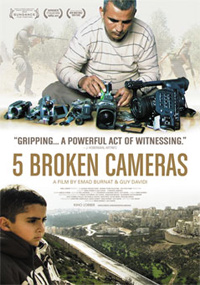Observational Politics: Burnat & Davidi’s Document of Strife
 Assertively observational is one way to describe Emad Burnat’s debut, 5 Broken Cameras, winner of the World Cinema Directing Award at 2012’s Sundance Film Festival. A quietly rebellious outcry, Burnat’s “accidental” film (a collaboration with filmmaker Guy Davidi) similar in scope and purpose as Jafar Panahi’s recent This Is Not a Film, is most certainly distressing, but it’s also an obviously extremely personal documentary, one that fails on nearly all counts to be subjective.
Assertively observational is one way to describe Emad Burnat’s debut, 5 Broken Cameras, winner of the World Cinema Directing Award at 2012’s Sundance Film Festival. A quietly rebellious outcry, Burnat’s “accidental” film (a collaboration with filmmaker Guy Davidi) similar in scope and purpose as Jafar Panahi’s recent This Is Not a Film, is most certainly distressing, but it’s also an obviously extremely personal documentary, one that fails on nearly all counts to be subjective.
When his fourth son, Gibreel, is born in 2005, Palestinian villager Emad Burnat gets his first camera to document the newest addition to his family. Concurrently, the Israeli government began to build a wall through the middle of his village, Bil’in, destroying or taking over much of their land. As Emad begins to film the resulting dilemma, which first begins with a peaceful demonstration led by Emad’s friends Adeeb and Phil, he begins to capture on film the swiftly escalating turmoil, and as time goes by, the conflict rages out of control, leading to Emad’s friends and family being endangered. As time goes by, Emad’s cameras are shot, damaged or systematically destroyed, resulting in footage from five different cameras that were either purchased or given to him as gifts. Already a self-taught cameraman, Emad’s ability to film the situation that engulfs his daily existence improves with ever greater alacrity. Eventually, his need to film and to document consumes him. Through various injuries, arrests, and deaths of loved ones, Emad’s will to record everything prevails.
At its best, 5 Broken Cameras is an unfettered glimpse at life near the Palestinian-Israeli border, a current litmus test of the still raging conflict. Burnat manages to catch a discomforting amount of senseless, unnecessary violence and aggression towards peaceful protestors. The death of one of his close friends is particularly devastating, a segment that shows us a man that, only several cameras before, was filling others with hope. Emad juxtaposes family life with the conflict raging outside, focusing mainly on the development of his youngest son, born at the time he acquired his first camera. Just as each son reflects a different episode of his own life, each camera manages to tell a different story, each one catching Burnat’s family developing under ever increasing violence and conflict. It’s his shots of family that are most effective, whether it be his children laughing, or his wife begging him to stop filming and restore a sense of peace, at least to their daily lives as family.
However, Burnet manages to buttress his film with a great deal of overly manipulative footage, namely with endangered and/or confused children, plaintively asking why friends and loved ones are killed. A suspiciously emotion evoking original score from Le Trio Joubran (Samir, Wissam, and Adnan) works a bit too effectively at many a turn, and Emad’s own description of his friend Adeeb as someone “always looking to make a scene,” don’t necessarily correspond with Emad’s repeated assertion that he’s only filming to document. There’s more going on then simply catching images on film so what’s going on will never be lost by time and a dulled memory. 5 Broken Cameras is definitely worth a look but offers nothing innately new to audiences engaged in current events or those resigned to apathy concerning resolution in the Palestinian-Israeli conflict. Simply documenting what’s going on does nothing to change the situation or the hopeless amount of violence being waged without an end in sight.


